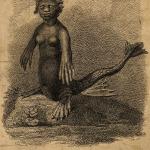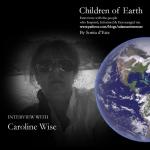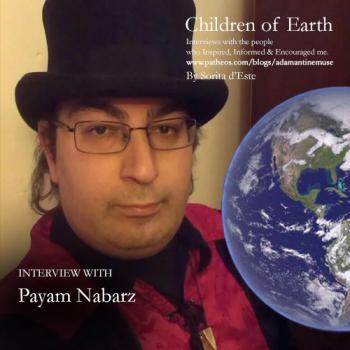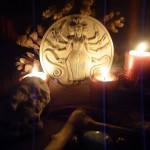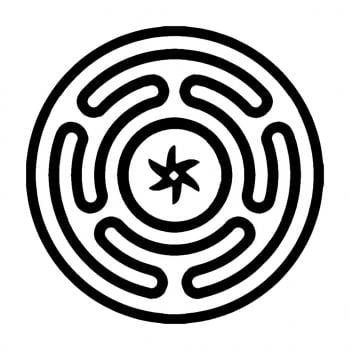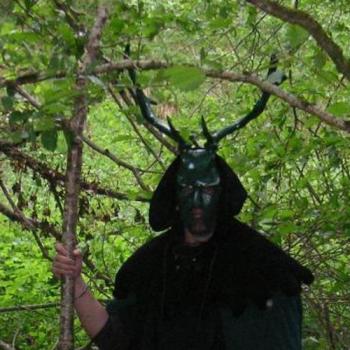I first met Morgana in 2002 at a Pagan Federation Conference in London, back in the days that the PF organised large national events at Fairfield Halls in Croydon. At the time, I was a new-to-the-job fledgling High Priestess and meeting Morgana was a bit like meeting royalty! The scene has since changed a great deal, but Morgana continues her work with Wiccan Rede and as the International Coordinator for the PFI (Pagan Federation International) from her home in the Netherlands today.
She also travels extensively, presenting on the topic of Wicca and Paganism at conferences and festivals around the world. Furthermore, Morgana is a board member of URI Netherlands and represented PFI & URI at the Parliament of the World’s Religions in 2004 (Barcelona), 2015 (Salt Lake City) and 2018 (Toronto).
I had the honour of visiting her earlier this year and participating in the PFI SPRING GATHERING – geworteld in traditie (Spring Gathering – Rooted in Tradition) in the Netherlands, which was a very positive experience. Her enthusiasm for continued learning, her quest for knowledge and her passion for both Paganism and Wicca is an inspiration. I can also say that even though she has never been my teacher in any official capacity, I feel that I have learned a lot from observing her work and our long chats over the years.
I am therefore delighted that she agreed to participate in this series of interviews with me. I asked Morgana about her work with the PFI, Silver Circle and her involvement with Gardnerian Wicca since the 1970’s … her travels, and of course – our shared love for the goddess Hekate!
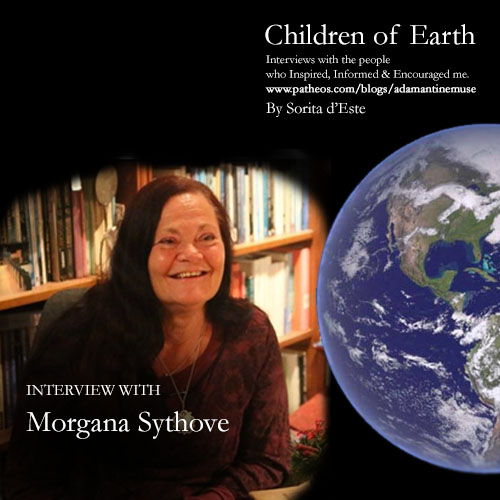
Interview with Morgana Sythove
By Sorita d’Este
Children of Earth: People who Inspired, Informed or Encouraged me
SORITA: You were initiated as a Priestess and Witch into the Gardnerian Tradition of Initiatory Wicca in 1979 in England, so this year marks 40 years since your initiation! Congratulations! What led you to seek out Gardnerian Wicca and undertake initiation?
MORGANA: Yes, I was initiated in Brighton (UK) at the Autumn Equinox in September 1979. My conscious quest started in 1978 after I spent a year or so travelling overland from Greece to India, Nepal and Sri Lanka. When asked as a child ‘what would you like to be…? ‘ I would answer …’ a teacher’, but deep down I really wanted to be a Priestess. This was one of the foremost incentives to travel and discover other cultures, explore different religions, and so on. My first journey was to the Netherlands, where, I worked as a teacher in 1974 – yes, I did train to be a teacher – and group leader at an Anthroposophic Camphill village. I really enjoyed learning more about Anthroposophy and the teachings of Rudolf Steiner. But my quest to become a Priestess still lingered and off I went to India in July 1977.
On my return to the Netherlands, Merlin and I decided to find out how we could find out more about Wicca and ended up following Marian Green’s postal course, “Natural Magic”. We also made acquaintance with the work of Dolores Ashcroft-Nowicki and The Servants of the Light. I felt clearly more attracted to Earth Magic but understood the importance of Occult Laws, having read much and practised Occult Science (Steiner).
The real breakthrough came in 1978 when on holiday in England Merlin found a single piece of paper at The Atlantis Bookshop on which there was a call for seekers to join a Gardnerian Coven in Brighton. No telephone number only an address. On our way back to the Netherlands via the New Forest and Brighton, we decided to call on these people. It was late afternoon, and I knocked on the door of an old Victorian house. The door opened, and a man – who was the spitting image of Gerald Gardner – stood before us. However, he just looked at us and closed the door! A minute later, the door re-opened – he said, “I have to pick up my wife, would you like to come?”. Two seconds later, we were in a car with a complete stranger heading for the centre of Brighton.
We parked outside some offices in the centre of Brighton and out came a lady, in her late 30’s early 40’s. She looked at us and said “Aha…I guess you will be staying for dinner?” Later she told us that they had been expecting us! We joined them for dinner and talked and talked. Who were we? What were we looking for? Who were they? We met them, and some other people, once more before leaving to go back to the Netherlands.
About three weeks later I was called to answer the phone in the house where we had a room. In those days international calls were expensive and were usually only about life & death. Imagine my shock when it was Anna from Brighton asking me if we would like to be initiated? Yes, of course! I stammered… and the rest is history.
(For a more detailed account check Enchantment of the Silver Circle by Gwiddon: https://silvercircle.org/wicca-hekserij/enchantment-silver-circle/)
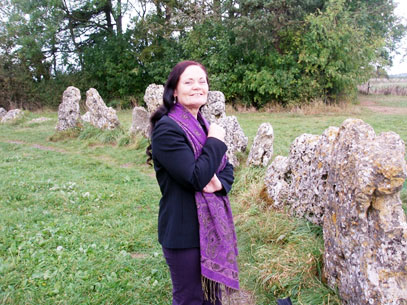
SORITA: With the late Merlin, you co-founded the first Gardnerian Coven in the Netherlands, and initiated others into the Craft. Not only that, but together you created some of the other foundation stones for the scene as it today through the work you supported each other with. What was the early scene like in the Netherlands?
We co-founded the SILVER CIRCLE network just after we were initiated and also created a newsletter. The quarterly magazine “Wiccan Rede” was officially launched at Spring Equinox 1980. We didn’t form a coven until we initiated our first lady at Autumn Equinox 1984. Five YEARS after our own initiation. This may sound like an incredibly long period but in 1979 very few people had even heard of Wicca, moderne hekserij in the Netherlands. Wiccan Rede – the name of our magazine, was a play on words – Rede means discourse in Dutch – and it was our way of introducing Wicca to a Dutch audience.
We also started organising a monthly information group – “the Friday evening group” at our home. We would deal with topics which were specific to Wicca but also topics of a more general nature such as ley-lines, magical practice and so on. There was also the social aspect – getting to know people and helping them on their own quest or ‘magical mystery tour’.
Apart from Wiccan Rede – we also published booklets. In 1982 my series of 8 articles “Beyond the Broomstick” was translated into Dutch and published as an A-4 booklet “Twijgen uit de bezem”. In 1983 we published a series of essays in a booklet called “Tapestry of Wicca” / in Dutch “Heksenkring”. Both Dolores and Marion submitted essays- they had already submitted articles to Wiccan Rede; so we had a diversity of subjects which were being discussed. I will always be very grateful to them for supporting us in those early days.
In the Netherlands in the same period – late 70’s early 80’s there was another magazine ‘Bres’ (launched in 1965 and still being published) where articles were being published by ‘free thinkers. Simon Vinkenoog – a famous Dutch poet – who also wrote for Bres from 1968-2004, was one of our first admirers. He invited us to an event in the South -in Limburg- in about 1981. He was very interested in what we had to tell about Wicca. This lead to an article authored by Merlin being published in Bres, about Wicca and the Goddess. Merlin would later be asked for several interviews – I always refused to do interviews, partly because I was working in the Banking Sector by then and I didn’t want to be recognised.
So in the 1980’s and early ’90s things were moving along nicely. We were able to explore our own Gardnerian Wiccan path and occasionally exchange ideas with Alexandrians, who were also becoming more active in NL. Our contacts with England continued, and we made a number of friends in the US, Canada and Australia as we all exchanged our newsletters and magazines. How things would change with the advent of the Internet!
SORITA: You are originally from the UK but moved to the Netherlands with Merlin. What do you feel the key differences are between the scene in the UK and the Netherlands today?
I moved in 1974 to the Netherlands and met Merlin in 1976. He was Dutch but was interested in everything English. He had been on cycling holidays to England – and even met Maxine Sanders one summer. It wasn’t long after we met that we discovered our mutual interest in the Old Religion.
I think one of the major differences between the UK and NL as far as Wicca is concerned is the difference between the English and Dutch mentality. When I first moved to the Netherlands, I thought that the English & Dutch would be fairly similar in their ‘ethnicity’ and cultural identity. I quickly found out that this is not the case. That English & Dutch are linguistically related, both deriving from ‘Neder-deutsch’ or ‘Low German’ does not mean to say they are culturally related. Both nations have similar colonial pasts and close histories. However the Dutch were the great adventurers and sought trading opportunities while the Brits were the great bureaucrats, often stepping in when the Dutch moved on. The Dutch also became famous for their religious tolerance accepting Jews, Muslims and many others when in the late 15th century they were persecuted. Even during the ‘burning times’ there was less persecution of heretics in NL than in the rest of Europe.
Not only was there religious tolerance, but there was also a culture of ‘Freethinkers’ which led to a liberal, open-minded society where Gay Rights and many other human rights had been fought for. The Netherlands was the first country in the world to extend civil marriage laws to same–sex couples in April 2001. When we introduced (Gardnerian) Wicca in 1979, we didn’t have to have to fight against antiquated Church Laws. The constitutional right described in Article 1 of the Dutch constitution also helped us in our positioning:
“All persons in the Netherlands shall be treated equally in equal circumstances. Discrimination on the grounds of religion, belief, political opinion, race or sex or on any other grounds whatsoever shall not be permitted.”
This attitude of open-mindedness is still an integral part of Dutch society. Of course, it is not perfect in the Netherlands and in recent years there has been a hardening of opinions as populist ideas have become the order of the day. Nevertheless, the attitude towards religion and what is now called ‘multi-religious belonging’ has enabled people to mix and match. The four major cities – Amsterdam, The Hague, Rotterdam and Utrecht are all super-diverse meaning no one ethnic group has the majority.
We have to live together, and from a Wicca perspective, if someone describes themselves as a Christo-wiccan, there is little I can do. And why would I? Even though I might find mixing Christian Commandments with a Wiccan ideology incompatible, I also see Christians using Wiccan standards and creating rituals at home to worship the Christian God.
I can see the benefit of Wiccanish/ Wiccanesque practice and influence in general. Some diehards may object to Wicca ritual being used – but then again, the same diehards often don’t want to see Wicca evolve either.
Certainly, I hope that my brand of Wicca has evolved. I have always seen it as being organic, and it would not be natural if it didn’t change and evolve.
Society too, of course, … but to come back to your original question of what the difference between the Wicca scene in UK and NL is these days… considering the above, not much more than there ever has been!!!
SORITA: The interest in Wicca has exploded over recent decades. With that, the publication of material which was (and still is by some) considered oathbound, both by dedicated initiates and sometimes rather unsavoury characters. What are your views on “oathbound” vs “secrecy and privacy” in the Craft in the 21st century?
Gardnerian & Alexandrian Wicca or Initiatory Wicca (the Americans like to call it BTW/ British Traditional Wicca – a term many of us find incorrect and don’t use at all.) is for me first and foremost a Mystery Religion. The very act of taking an Oath means that you agree to certain things. To break your Oath can have far-reaching consequences. I remember a friend who was connected to Asatru explaining that breaking an Oath was worse than murdering someone because you could no longer be trusted.
Since the concept of ‘Perfect love and perfect trust’ is at the core of our ethical code once someone has broken their promise and therefore their trust and betrayed the coven it is very difficult to redress the balance. It is not impossible, but as we all know, once we lose our trust in someone, it takes a long time to regain it.
Connected to the Oath is the need for secrecy and privacy. I don’t see them as separate things. Again I trust that someone who is initiated into my coven will not reveal details about other members, or the name and locality of the covenstead unless it is to someone else who is also Oathbound in our tradition. But even then, I trust that people will be discrete.
I am often amazed at how much of this kind of information can be found on Internet/ Social Media. Covens who have websites and advertise themselves as such is something I still can’t get my head around.
As far as Oathbound material being available on the Internet is another thing which I find sad. For one thing, it has encouraged people to elevate the importance of the Book of Shadows. Which is ironic when you think about it. Wicca was never meant to be a ‘Religion of the Book’ … but because of so much emphasis in recent years on ‘an authentic BoS’, it has resulted in dogmatisation. As I said earlier, I think Wicca is ORGANIC and should not be strangled by dogma.
SORITA: How important are the Gods in Wicca?
We often hear that the Gods need us as much as we need them. I don’t think the Gods as such are important in Wicca. I do think our connection with deity is. I always emphasise to newcomers that personal practice and their connection to the worlds of gods is paramount. I think it was Joseph Campbell who pointed out that Mythology is the language of the Gods.
Get to know the stories and legends of the Gods. Many of the people coming into Wicca are also connected to the land and have more of an affiliation with Nature Spirits… or are aware of a universal creative energy. It has been good to see – in my case – many old European Gods come alive again in recent years… so yes as soon as we remember them… they are important.
SORITA: You are also very involved with PFI, the Pagan Federation International. Through that, you have encouraged many people to create local points of contact in countries around the world, and you have also encouraged (and organised!) many regional conferences around the globe – providing points of contact for people to meet and share information. How important is this work to you and why?
My journey or quest in finding people who were willing to help me become a priestess was something I wanted to share. I was also interested in all forms of paganism and what better way to find out more than to set up a network. Our Silver Circle Network was functioning well in the Netherlands – and later as we had initiates in Germany, Spain and Russia. Our focus was on Wicca, of course.
Many of my fellow witches were also involved with Pagan Federation in the UK. I too became a member and in 1996 attended the National Conference in London. Gradually the idea of becoming more visible abroad grew, and by 1997 PF International was operative. Lady Bara, who was an Alexandrian HPS and I formed PFI Netherlands, and later in 1999, I became the International Coordinator.
PF/PFI gave me the opportunity not only to work on anti-defamation issues – one of the core objectives of PF – but also to connect with pagans internationally.
With PFI, I could also help people ‘find their way’ and perhaps embark on the magical quest I had undergone. And so we built the PFI network according to the needs of the members. It was always much more organic than PF … I can’t help applying my own Wicca insights into many of my organisational projects !
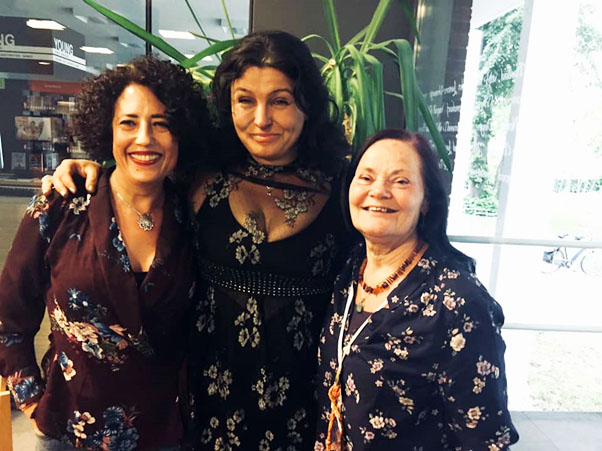
SORITA: I am one of the many people who follow your adventures on social media. You are always out there meeting new people and experiencing new places. Through your travels, you have managed to establish contact with some fascinating people not only within the Pagan and Craft circles but also through some of your interfaith work in other spiritual traditions. What do you feel you have learned through this vital work?
I still love finding out about different cultures, travelling and meeting many different people. It is still part of my magical journey and has also contributed to my interest in Interfaith, which I view incidentally as a way of life, not a movement.
My own travels in the late 1970s were fuelled by my search to be a Priestess. Becoming a Wiccan Priestess later gave me my own point of departure and a foundation from which to build on. In many respects, I was a ‘true’ Gardnerian following in the footsteps – and spirit – of Gerald Gardner and his love of different cultures, folklore and so on. I was impressed by how eclectic he was and it inspired me to looks beyond the borders of my own existence, physically and metaphorically.
I quickly learned when I resumed solo travel in the mid-1990’s – Merlin was not a great traveller – that if you showed an interest in local culture and dared to talk with local people, they would often be very willing to chat. … and sometimes show you things most tourists would never see. Perhaps as a Priestess, I knew that I had to gain the trust of local people, especially if we talked about spiritual and religious matters.
People would share stories about customs, miracles, haunted buildings, sacred sites, herbs and all kinds of things. In response, I would tell them a bit about myself, and I could see from their reaction if they were ‘open’ to my pagan outlook.
This was really, in hindsight, a good exercise in engaging in interfaith and intercultural dialogue.
SORITA: I know you share my passion for the Goddess Hekate. You contributed to Hekate: Her Sacred Fires (2010) and wrote about your experience at the Temple of Hekate in Lagina (Caria, modern-day Turkey). Why was this such a significant experience for you – much more so than so many of the other places you have visited?
Oh my goodness, indeed. If I was to pinpoint a moment when this all started – it was in 2004, at the Parliament of the World’s Religions, Barcelona. At the Parliament, I joined the US Pagans representing PFI. Selena Fox, from Circle Sanctuary, invited me to join her on a panel about International Paganism. Together with Michael York, we presented the panel discussion. That really was my initiation into the world of Interfaith.
However, it was Don Frew (and Anna Korn) who introduced me to URI/ United Religions Initiative a new interfaith organisation from America. He also told me about a more personal project called the “Lost and Endangered Religions Project / LERP” : http://interfaithpresidio.ipage.com/blog/lost-and-endangered-religions-project/ And about the YEZIDI.
Shortly after PWR, I met a young Turkish guy who was moving to the Netherlands and wanted to meet like-minded people/pagans. We met at one of our local ‘Witches Cafes’, and we later became good friends. I asked him about the Yezidi and if he knew of anyone who had contact with them. He advised me to get in touch with a friend of his in Istanbul, which I did.
In late 2004 this contact led to the formation of PFI Turkey. Later we would organise a cultural exchange with the people in the village Turgut – which is very close to the Sanctuary of Hekate, Lagina. The actual tour started in Bodrum/ Halicarnassus and in September 2005 culminated in celebrating the ‘Hekatesia’ and a full moon ritual.
This visit formed the basis of my essay ‘Sacrifices will be made’ which was indeed included in the book Hekate: Her Sacred Fires (2010).
I should add though that during 2004 – and later, after the Hekatesia, – I had various mystical experiences which led me to find out more about the Yezidi … and bees!
I was there for the last time in 2015, and interestingly enough one of the guards remembered me. He said he remembered the ritual we did ‘because we used torches’. After that, he decided to learn more about Hekate. He then showed me some of the latest excavations and specifically pointed out the symbol of the double axe/ labrys. … a symbol which I always wear. It was if we spoke together as Priest/priestess.
The plight of the bees, of the Yezidi and lost cultures is still high on my list of priorities. I am still looking into Hittite Culture and still hope to go back to Anatolia one time. So yes, my connection with Hekate has been very important.
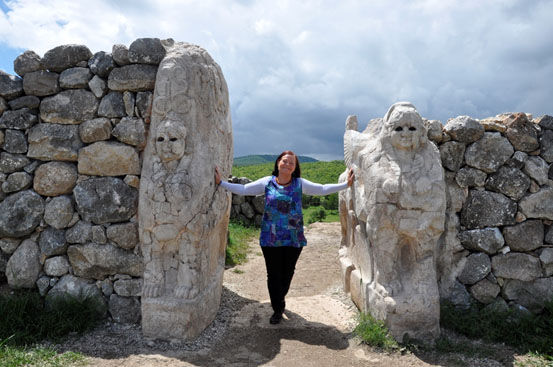
SORITA – You are also the author of Beyond the Broomstick, which is available in several languages. Why was it imperative for you to write this book?
It wasn’t meant to be book! Originally it started out as a series of 8 articles in English for our quarterly magazine “Wiccan Rede”, spanning 1980-82. By 1982 Merlin translated the articles into Dutch and we published it as a booklet, “Twijgen uit de bezem”. This would serve as a primer about Wicca for many years.
In 2008 a friend wanted some articles in English for a publishing house she was setting up. I suggested the series “Beyond the Broomstick”… and so it became a book. Later there appeared to be such interest that people wanted to translate it and so several translations were made and published.
I don’t actually consider myself an author of books. I prefer to write articles or publish in-depth articles by other people in Wiccan Rede Online. In recent years there seems to be a plethora of short articles, blogs about ‘how-to-do’ things and less about the philosophy of Wicca/ Paganism. So as editor of the English section I am always on the lookout for in-depth articles.
I am always interested in books published by Avalonia Books because they are thematic and well-researched and I try to review them.
SORITA: How significant do you feel Mystical Experience is to the practice of Paganism and Wicca?
In a nutshell – it is the core of our practice.
For me, Wicca is first and foremost a Mystery Religion. It is based on the first-hand experience of the Mystery… of life, of death, everything which affects us spiritually and ultimately physically. How do we deal with tragedy, celebrate life-rites, and so on.
We can teach people the techniques of meditation, visualisation, and introduce them to other philosophies, magical systems etc. but ultimately it is a personal mystical experience, or way.
While we can share ritual space, our experiences are individual. The egregore of the group changes with every new initiate and sometimes the groupmind will lean towards a certain style – sometimes more like a magical group, another time more of a healing group.
I remind people that it is not necessary to be initiated into Wicca to worship the gods or have mystical experiences. Many people have come to see the value of a ‘Self-dedication’ – it depends on YOUR connection with deity/deities – as I mentioned earlier.
Sometimes the path of the Solitary can be much harder because it demands a huge amount of self-discipline. Finding people who have similar interests – or connection – with a particular deity – is wonderful. I have seen how amazingly well the Covenant of Hekate has worked!
SORITA: You are one of the Elders of the Craft today, not only by having the right degree initiations but also because you have earned it through the many years of practice, together with the work you have put into the scene to help others find their respective paths. What advice would you offer others who are in the process of starting their first Pagan group or community event?
Be really clear about your intent and motivation. Why do you really want to do this?
Be prepared. There are plenty of guidelines about organising pagan events, including Codes of Conduct, and so on. Be clear in your own mind about how you and your team will deal with adverse publicity, trolls, complaints etc.
Are you organising a moot on behalf of an organisation – make sure you are authorised to do so. There is nothing worse than an organisation being accused of misconduct when they are not even involved. And no, bad publicity is not better than no publicity. If in doubt get in touch with the organisation and check with them if you can organise a moot on their behalf.
If you advertise moots etc. on social media or diverse fora such as Witches VOX, PFI etc. make sure you remove the ads if you discontinue. Someone – like me! – has to deal with all the enquiries and explain that such and such a moot no longer exists.
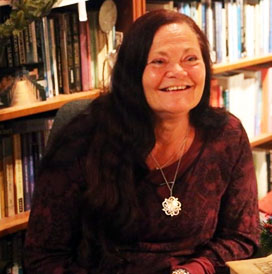
SORITA: Are you working on any new and exciting projects you can share something about with readers here?
Silver Circle and Wiccan Rede will be celebrating the 40th anniversary in 2020 !
We are already working on a couple of things to celebrate this event. One is to revise and publish Merlin’s book “Moderne Hekserij – Wicca, een portret van een natuurreligie” (“Modern Witchcraft – Wicca, a portrait of a nature religion) It was originally published in 1999 by a Christian publishing house and has been out-of-print for a while.
We believe it is still relevant in the 21st century and valuable for seekers – young and old. Perhaps someone will be interested in translating it?
Wiccan Rede Online- bilingual Dutch and English – is still active and has included many international authors over the years and we may republish some of the early articles. In 1983 we published a booklet with essays from a number of people including Marian Green & Dolores Ashcroft-Nowicki, called ”Tapestry of Wicca” (“Heksenkring “ in Dutch)
And of course, I am still hoping that SORITA will submit an article or two!
We are also working on the revision of the POLISH version of “Beyond the Broomstick” / “Poza Miotla” which should be published before the end of 2019.
Trivialities:
Your favourite book of all time?
As a child I loved ‘Nada the Lily’ by H. Rider Haggard
Your favourite character from history?
Robin Hood
Your favourite element?
Fire
Your favourite food?
Everything Italian
Your favourite number?
9 because it also 0
Your favourite planet?
The Moon
Your favourite plant?
Rose
Your favourite stones?
Amber & labradorite
Your favourite Tarot / Oracle deck?
The Greenwood Tarot
Your sun sign?
Aries, Gemini rising
Thank you to Morgana for taking the time to participate in this project. If you enjoyed this Children of Earth interview, please share it with friends and leave comments / questions.
To find out more about Morgana’s work, go explore these websites:
Silver Circle: https://silvercircle.org/
Wiccan Rede Online: https://wiccanrede.org/
PFI Forum: https://forum.paganfederation.org/
PFI/Pagan Federation International: https://paganfederation.org/
Code of Conduct: https://forum.paganfederation.org/viewtopic.php?t=5615
Morgana Sythove on Facebook: https://www.facebook.com/morganasythove

